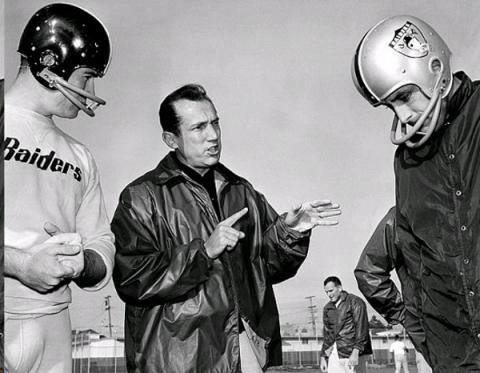Al Davis (R.I.P.), A Champion of Diversity

From New America Media: There were a lot of words used to describe Al Davis, the 82-year-old owner of the Oakland Raiders National Football franchise, when it was announced he passed away at his Oakland residence last [month]. Davis was called a legend, tough, demanding, ruthless, sneaky, renegade, pioneer, hall of famer and Oakland Raider.
Davis was all of these, as well as a stand-up man for diversity in sports and in particular his team. Davis was the first NFL owner to hire an African-American head coach, Art Shell, whom he hired as a head coach twice in 1989 and in 2006. He hired the first woman chief executive, Amy Trask, to run the business operations of the Raiders, and he hired the first Latino Head Coach in Tom Flores, who led the Raiders to two Super Bowl wins in 1981 and 1983.
Davis was an out-of-the-box thinker who just wanted to win. He hired the best people no matter what their skin color or gender. It did not matter to him as long as they produced.
Raised in Brooklyn, New York, Davis got into coaching football after attending Syracuse University. His first coaching job was at Adelphi College. He worked as a scout in the NFL for the Los Angeles Rams and then as an assistant coach at the University of Southern California for three years. In 1960, he worked with the Los Angeles Chargers, before getting his big break and taking over as head coach of the Oakland Raiders in 1963, at the age of 33.
In his first year as Head Coach of the Raiders, Davis helped lead the team to a 10-4 record, winning him the AFL coach of the year honor. That year, Davis’s Raiders were scheduled to play a pre-season match in Mobile, Alabama, but in protest against Alabama’s segregation laws, Davis refused to have his team play there. In 1965, the American Football league was scheduled to hold its all-star game in New Orleans and due to that city's segregation laws, Davis had the all-star game moved to Houston.
“Davis was a drum major on political issues of football, he was the NFL’s moral conscious. He developed more leaders in professional football than any other person,” Clem Daniels, one of Davis’s former Raider players in the 1960’s, said of his former coach. “He was the type of person that was mindful of social issues in the community and did something about it.”
Davis would coach the Raiders for three years before becoming the Commissioner of the American Football league in 1966. As commissioner, he helped to force the merger between the AFL and the National Football League, to make the NFL the powerhouse number one sports league that it is today.
Davis would go back to being the general manager of the Raiders in 1967. As the general manager, he was one of the first football minds to start scouting and signing players from the historically black colleges in the 1960’s and 1970’s, signing Raider stalwarts and NFL Hall of Famers in Art Shell, Gene Upshaw and Willie Brown. Davis drafted the first African American quarterback, Eldridge Dickey, in 1968, in the first round of the NFL draft.
“Davis was a pioneer,” said Raymond Chester, another former Raider player from the 1970’s. “There was never any racism within the Raiders, we did not see color and neither did Davis as he built the league.”
From the 1960’s through the early part of the 1990’s, Davis’s Raiders were dominant teams. But the team would falter after a series of bad drafts and personnel misjudgments. Davis would be ridiculed by some for being too much of a hands-on owner who was a meddler in team affairs. Or as a team owner, who used politicians or fan support to get his way – such as his controversial lawsuit against the NFL and his infamous decision to move his team from Oakland to Los Angeles in 1982 and then back to Oakland in 1995.
Davis however, should be remembered for his trailblazing status as a coach, general manager and team owner who broke down barriers throughout his stewardship of the Oakland Raiders, a legacy that has helped to set the standard for the NFL today.
Author Bio:
Commentator Lee Hubbard writes on sports and social issues for New America Media.






























































































































































































































































































































